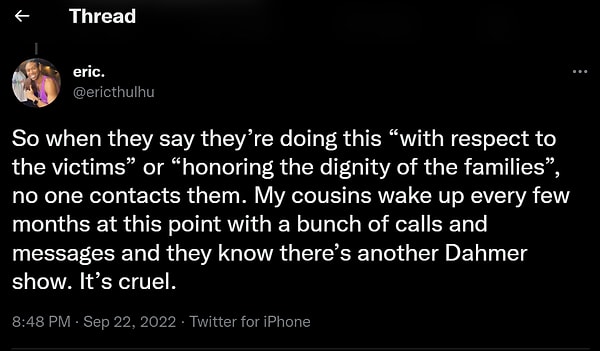'The Jeffrey Dahmer Story' and the Moral Conundrum Facing the True Crime Genre
As a huge fan of horror, it was impossible for me to pass up 'Monster: The Jeffrey Dahmer Story.'
Like many people, I've spent years studying him, watching biopics and documentaries, reading about the history of his crimes. I asked myself about nature and nurture. I picked up on his dull stare and his hushed tone, and I wondered what twisted lesson could be learned from him--at least that's what I told myself.
In truth, I didn't really care about the psychology behind any of it. People do freaky things. They just do. Instead, I was pushing past my gag reflex, training myself to digest the horror of it all, the drill, the skulls, that poor man who begged the police to help him. I wanted to know this monster's secrets. He was in a fishbowl, and it was just too intriguing to look away. It was hell's gossip.
I wasn't alone in this. I was part of a trend that has dominated American media for decades. We cannot get enough of these icons. We grab a microscope, shove them onto a slide and stare, and we keep staring, hoping for a new angle, a new rendition, another piece of the puzzle to keep us salivating.

Courtesy of Madhouse
Nothing seems to hold our attention better than a good kill, and Hollywood knows that. Some of our most memorable moments in film, from the lotion in the bucket to Norman Bate's knife, are all centered around serial killers and murder.
We have entire channels devoted to perpetual true crime. Every night, there's at least one murder mystery on network television, each sicker than the next, and it's not a niche market. Most of us can't get enough. Whether we're young or old, there's something about these creatures that is so interesting we can't stop obsessing over them.
Why do we put these people on a pedestal? How did they become rockstars? Why do we act like they're superior beings? They're not special.
There are men rotting in jail right now with a body count that would make Bundy look like a saint. They're relatively common. In fact, some estimates put the number of active serial killers in the U.S. at 3,000-4,000. But that's just a shot in the dark. In general murderers are only convicted about 40% of the time, so we can't be sure. The number is probably much higher.
Many of the household names we hear so often were chosen because of the media circus surrounding their crimes, not because of who they were. Aileen Wuornos is the perfect example of that. She was labeled as the first female serial killer in history, when really she was just the first female serial killer profiled by the FBI. She was also dumb as a rock--the perfect model of what you'd expect to see from your run-of-the-mill inmate.
She has no place in any hall of fame, and neither do the rest of these clowns. But we keep rehashing their crimes in the media, time and time again. 'The Jeffrey Dahmer Story' is just one example of that.
There's a real moral conundrum that has yet to permeate the societal discourse surrounding these people, and it doesn't just extend to household names. We have to talk about the entire true crime genre, because it's hurting victims and their families for the sake of entertainment.
The Actor Who Played Dahmer Was Well Aware That They Needed to Be Careful
When 'The Jeffrey Dahmer Story' went into production, they decided that the series would not be told from the killer's perspective. They didn't want to get into his head or idolize him, which has been a problem before with other serial killer biographies.
Instead they wanted to focus on the repercussions of his actions, how it affected his victims and the people around him. They also wanted to highlight the systemic issues like racism and homophobia that made it easier for him to continue hurting others.
That makes sense. Ryan Murphy has long put the spotlight on social politics, but he's never been good at keeping us out of killer's heads--quite the opposite. We still see Dahmer as a child collecting roadkill with his father, experimenting with animal forensics and demented biology. We saw where he came from. We also saw his obsessions, the male mannequin he stole, and his sexuality. They broke that rule so much, they never should've brought it up. It didn't seem like they intended to stay out of Dahmer's head at all.
It didn't make sense for Evan Peters to take on that role, either. Plenty of fans must've been shocked when they saw him.
Acting is not an easy profession. Many actors try to become their characters, think like them, move like them, and talk like them. They'll even go so far as to live like them to prepare for the role. It's called method acting, and it is so immersive that the actor will have trouble stepping out of character. It stays with them, and sometimes it devastates their mental well-being.
Evan Peters has been very open about the fact that American Horror Story has forced him to seek mental health treatment.
He spoke about it in an interview with GQ, stating, 'It's just exhausting. It's really mentally draining, and you don't want to go to those places ever in your life. And so you have to go there for the scenes, and it ends up integrating it somehow into your life. You're in traffic and you find yourself screaming and you're like, What the hell? This isn't who I am. I fight really hard to combat that and make sure that I'm watching comedies and hanging out with my fiancée [actress Emma Roberts] and chilling with friends and watching movies.'
After starring in 'American Horror Story: Cult', he was forced to leave the series, saying that it took 2 years to recover from the affect it had on him. He also spoke about the humiliation of being naked onset, how the costume would malfunction, exposing him fully in front of big screen titan Jessica Lange.
Let's ignore Peter's sex for a moment and imagine a female was saying that. It's no different. He's humiliating himself and driving himself insane for our viewing pleasure. Unnacceptable. He said he was particularly disturbed by the scenes that mixed sex and gore.
Some actors can put themselves through that, but not Peters. That alone should be enough to second guess the production--not the entire genre, but most certainly the production.
Peters didn't come back to set a changed man, capable of stepping into the shoes of a monster. In fact, he was quite hesitant about the role. This is someone who couldn't play a toned-down version of James Patrick March. The cult season didn't seem like it would take a toll on anyone.
Neither role dug into the antagonist's head. They just had short scenes portraying their crimes. It was campy, often fun, and easy-going. March's motivations weren't examined. He was simply introduced as a killer. The cult leader was crazy, but just like March, it was camp.
So when Peters was asked to play Dahmer in an intense, intimate bio, it comes as no surprise that this would be a daunting endeavor for him. Peter speaks about that in the Netflix interview in the video above.
“Honestly, I was very scared about all of the things that he did, and diving into that and trying to commit to that was absolutely going to be one of the hardest things I’ve ever had to do in my life because I wanted it to be very authentic,” he said. “But in order to do that, I was gonna have to go to really dark places and stay there for an extended period of time.”
He goes on to say, 'I have to say that the crew was instrumental in keeping me on the guard rails. I cannot thank them enough and I could not have done any of this role without them.'
He needed the help of the crew to get through the filming emotionally. What was he subjecting himself to? It sounds like he was breaking down on set during filming, and who wouldn't? He was putting his heart and soul into entering the mind of Jeffrey Dahmer.
Evan Peters is not alone in this. Hollywood needs to be more sensitive to the effect these films have on actors. There needs to be a way for them to survive production with their sanity intact, and if that's not possible, they need to find someone else.
There is no proof that his acting techniqes are superior. Some people say they are, but not everyone in the industry subscribes to this method, and their performances are just as compelling and believable. Perhaps the problem is more than just the public's obsession. Clearly Hollywood has its own issues.

Courtesy of FX
The Victim's Families Were Traumatized and They Spoke Up
Name one of Ted Bundy's victims. Name one of Aileen Wuornos's victims. What about Dahmer's victims?
A few of us have gone deep enough down the rabbit-hole that we can start listing off their names, but most of us don't remember of any of them. We've been so focused on Dahmer and the rest that we have forgotten the point of all of this: the people that were hurt.
We can't continue to hold on to this mindset, because they left families and loved ones behind, and they are still suffering.
Imagine what it would be like to see their faces everywhere, their pictures, their possessions, their room. Eventually when we grieve we have to set all of that aside, or we'll be so focused on our loss that we won't be able to live.
The families of Dahmer's victims can't do that. The public won't allow them to heal. Instead we're constantly ripping their scabs off by blasting their trauma using whatever means we have available to us. The consequences of that are beyond anything we can imagine.
It's horrific, and they've been expressing their grievances for a very long time. On September 21 when the show premiered, Eric Perry, the cousin of Dahmer victim Errol Linsdey, tweeted the following:

Courtesy of Eric Perry (@ericthulhu) Twitter Account
When a new series comes out, it's customary to do a press racket. They give interviews, make behind-the-scenes footage, appear on vlogs and TV networks. This allows them to control their reputation and address any potential grievances that might come up when their production premieres.
That's why Dahmer made a big deal of telling the world that they were respecting the victims. They made extra footage. They released a giant statement. It's all over the press for a reason.
This kind of tactic is wildly effective. Time and time again, audiences accept what they're told as truth. The word 'advertising' never even crosses their minds. That's why studios do press rackets. Nobody sees through them.
The familed of the victims were not respected. How could they be if they weren't even notified? They were not consulted. The show did not receive a giant premiere. It just dropped all of a sudden. It's because the studio knew the victims would have something to say, and they did. Perry tweeted multiple times, adding, 'It's just retraumatizing people over and over again, and for what?'
For entertainment.

Courtesy of Netflix
Victims of True Crime
Over and over again, we hear about the victims of true crime triggered after finding tell-alls, or opening up Netflix. They'll flip through the channels and find themselves staring at one of those ridiculous documentary dramatizations. It's not uncommon. We can sympathize, but we could never fully walk in their shoes.
Trauma is a strange beast. We often think of PTSD as a lesser form of mental illness--easily treated, not like those real disorders that we hear about. It's all in their heads right?
No, it's not. It affects the body as well, and it can be just as severe and debilitating as something like schizophrenia.
Everyone is different, and this is a complicated subject. But it's not hard to find out about the symptoms that people can face. Trauma can cause uncontrollable panic attacks. It can cause flashbacks. Some people vividly relive their experience when they are triggered. Many face obsessive thoughts and an inability to focus on anything else. This comes in varying degrees, but when Evan Peters is everywhere you look, we have a problem.
Remember cannabilism and necrophilia were involved in Dahmer's killings, so there's no knowing telling where their minds go. Imagine trying to seek help for that when there's a Netflix documentary about your trauma trending on Twitter.
This might not represent the experience of Dahmer's victims, but true crime is wildly popular, and Hollywood is churning more out every few minutes. Someone out there could be having flashbacks and God knows what else.
We know Dahmer's victims' families are suffering. Clearly, we need to put this all in perspective. That's not to say that we should give up horror. People can be triggered by all sorts of things. At some point, it's not society's responsibility to filter them out.
Instead, we should probably focus on altering the way we handle stories with actual victims. Let's step away from true crime, stop turning it into the viral phenomenon it is today, and try to change our approach to it.
We could actually make an effort to be sensitive to mothers whose sons were the victims of necrophilia, instead of lying about our approach. We can consult with them, try to help them through the experience, and if things are too raw, we can find another story. That's what Ryan Murphy should've done with Dahmer. If the victims can't handle it, don't do it.
Keşfet ile ziyaret ettiğin tüm kategorileri tek akışta gör!

Send Comment
Catch yourself & stop watching! And, the trend will end! I started watching to see was there as thing new, OF COURSE NOT... the same sick crap & how utterly... See More